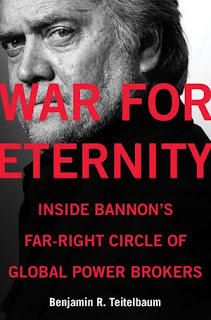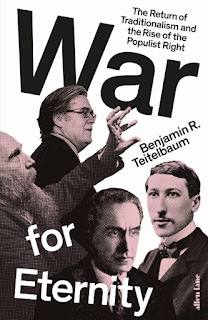Forthcoming from Bloomsbury in late 2020 or early 2021: Anarchist, Artist, Sufi:
The Politics, Painting, and Esotericism of Ivan Aguéli, edited by
Mark Sedgwick.
Contents as follows:
1. Ivan Aguéli: politics, painting, and esotericism—MARK SEDGWICK
PART I: Ivan Aguéli the Artist
2. Ivan Aguéli’s life and work—VIVECA WESSEL
3. Exploring the territories of the avant-garde: Ivan Aguéli and the institutions of his time—ANNIKA ÖHRNER
4. Ivan Aguéli the esotericist, in reality and fiction—PER FAXNELD
5. Ivan Aguéli’s monotheistic landscapes: From perspectival to solar logics—SIMON SORGENFREI
6. Painting the sacred as an initiatic path: Art and cubism in the eyes of Ivan Aguéli—THIERRY ZARCONE
PART II: Ivan Aguéli’s Politics
7. Kill the Audience: Ivan Aguéli’s universal utopia of anarchism and Islam—ANTHONY T. FISCELLA
8. Sufi Teachings for pro-Islamic Politics: Ivan Aguéli and Il Convito—ALESSANDRA MARCHI
9. Feminism and the Divine Feminine: An exploration of female elements in Ivan Aguéli and subsequent Traditionalist thought—MARCIA HERMANSEN
PART III: Ivan Aguéli’s Sufism
10. Ivan Aguéli's second period in Egypt, 1902–09: The intellectual spheres around Il Convito/Al-Nadi—PAUL-ANDRÉ CLAUDEL
11. Ivan Aguéli and the Islamic Legacy of Emir ʿAbd al-Qadir—IHEB GUERMAZI
12. Ivan Aguéli’s Humanist vision: Islam, Sufism, and Universalism—MEIR HATINA
PART IV: Ivan Aguéli and Traditionalism
13. The Significance of Ivan Aguéli for the Traditionalist Movement—MARK SEDGWICK
14. What is esotericism in art? Ivan Aguéli’s art versus the Traditionalists’ “traditional Art”—PATRICK RINGGENBERG
PART V: Writings by Ivan Aguéli
15. Letter from Paris—IVAN AGUÉLI
16. Letter from Ceylon—IVAN AGUÉLI
17. The Enemies of Islam—ABDUL-HADI EL MAGHRABI [IVAN AGUÉLI]
18. Pure Art—ABDUL-HÂDI [IVAN AGUÉLI]
19. Universality in Islam—ABDUL-HÂDI [IVAN AGUÉLI]
Sunday, April 26, 2020
Tuesday, April 21, 2020
Bannon, Traditionalism, Dugin, and Olavo
 Benjamin Teitelbaum has just published a major new book on contemporary Traditionalism, War for Eternity: Inside Bannon's Far-Right Circle of Global Power Brokers (New York: Harper Collins, cover to left) or, in the UK, War for Eternity: The Return of Traditionalism and the Rise of the Populist Right (London: Allen Lane, 2020, cover below).
Benjamin Teitelbaum has just published a major new book on contemporary Traditionalism, War for Eternity: Inside Bannon's Far-Right Circle of Global Power Brokers (New York: Harper Collins, cover to left) or, in the UK, War for Eternity: The Return of Traditionalism and the Rise of the Populist Right (London: Allen Lane, 2020, cover below).Teitelbaum is an American scholar who has previously published Lions of the North: Sounds of the New Nordic Radical Nationalism (Oxford University Press, 2017), an excellent ethnographic study of radical nationalists and the related music scene in Sweden, and although War for Eternity is written in light, journalistic style, it is based on thorough research, principally long interviews with its main subject, Steve Bannon.
 The book’s US cover and title focus on Bannon, but the UK cover and title are closer to the contents, as the book also covers several other Traditionalists, notably Alexander Dugin (Russia) and Olavo de Carvalho (Brazil), and then Gábor Vona of Jobbik (Hungary) and John Morgan of Integral Tradition Publishing and Arktos (online).
The book’s US cover and title focus on Bannon, but the UK cover and title are closer to the contents, as the book also covers several other Traditionalists, notably Alexander Dugin (Russia) and Olavo de Carvalho (Brazil), and then Gábor Vona of Jobbik (Hungary) and John Morgan of Integral Tradition Publishing and Arktos (online).Some of what is in War for Eternity will come as no surprise to those who know their Traditionalism and/or have read my Against the Modern World, but much of it is new and interesting. Most of all, Teitelbaum’s long discussions with Bannon reveal Bannon’s own, modified, version of Traditionalism, and resolve a number of mysteries.
- Firstly, what Bannon now takes from Traditionalism is, in his own words, “the rejection of modernity, the rejection of the Enlightenment, the rejection of materialism,” and the understanding that “culture, true culture, is based upon immanence and transcendence.”
- Secondly, Bannon reconciled Traditionalism with populism by identifying the American working class with tradition, and America’s globalized elites with modernity. In Guénon’s terms, in the hierarchy of values “proceeding from the body, to money, to earthly creeds, to Spirituality,” it is the elites who are slaves to money, and the working class that may perhaps access spirituality. In Evola’s terms, it is the working class who are the warriors: “The aristos don’t fight! They strictly don’t fight.” All in all, it is the working class that is “out of time, insulated from the corrupting influences of modernity; vessels for eternal ideals and carriers of a spirit that unites a society internally and separates it from others elsewhere.”
- Thirdly, Bannon agrees with the Traditionalists that the end of the temporal cycle means that destruction inevitably proceeds a new cycle. Trump is the great destroyer, though Bannon more often calls him “the disrupter.” The early moves of the Trump administration, in which Bannon’s ideas were still influential, were aimed at the destruction of the forces of modernity in the form of the “administrative state,” in this instance the federal government. Unfortunately from Bannon’s perspective (though he does not put it quite like this), Trump then also went on to destroy his own administration, and thus also the possibility of it actually achieving anything very much. That was not the original idea (though perhaps it was fortunate, at least for those who see the federal government as performing necessary functions).
- Fourthly, Trump’s enmity towards China fits with Bannon’s Traditionalist views. For Bannon, “The globalists are totally tied to the mercantilist totalitarian system of the Chinese. China is the economic engine that drives it all. Without China, it doesn’t work; that’s what’s driven the system.” Bannon tried to convince Dugin of this during a long meeting between the two in Rome, arguing that the Chinese are trying to create precisely the unipolar world that Dugin has spent much of his career arguing against. Bannon very much liked Dugin’s Forth Political Theory. It seems that Dugin was less convinced by Bannon.
Somewhat less interesting is the section towards the end of the book on the relationship between Jason Jorjani, an American activist of Iranian origin who is influenced by Traditionalist, and Michael Bagley, a con-artist who ended up in jail.
One criticism: the book perhaps relies too much on interviews, and more attention could usefully have been paid to what Dugin and Carvalho have written.
All in all, however, required reading.
Friday, April 03, 2020
Obituaries
Four of this blog's eight posts for 2020 so far have been obituaries. Although this feels like the passing of a generation, the four deaths were in fact of people from three different generations: Michel Chodkiewicz (1929-2020) was from the generation that grew up immediately after the Second World War, Eduard Limonov (1943-2020) was of the generation that made the 1960s, and James Cutsinger (1953-2020) and Yahya Bonnaud (1957-2019) were of the following generation.
What is striking, however, is that three of these four were interesting primarily in religion, while today's leading Traditionalists often seem to be interested primary in politics, not religion. So something is indeed changing.
What is striking, however, is that three of these four were interesting primarily in religion, while today's leading Traditionalists often seem to be interested primary in politics, not religion. So something is indeed changing.
Michel Chodkiewicz (1929-2020)
Michel Chodkiewicz died on 31 March 2020, at the age of 90.
Chodkiewicz was a leading French scholar of Ibn al-Arabi, a Muslim, and by origin a Traditionalist, once a follower of Michel Vâlsan, the Rumanian Traditionalist who broke with Frithjof Schuon and led an important tariqa in Paris for many years.
As I wrote in Against the Modern World,
Chodkiewicz was a leading French scholar of Ibn al-Arabi, a Muslim, and by origin a Traditionalist, once a follower of Michel Vâlsan, the Rumanian Traditionalist who broke with Frithjof Schuon and led an important tariqa in Paris for many years.
As I wrote in Against the Modern World,
Among other early followers of Vâlsan were a penniless marquis of the pre-Napoleonic nobility and a young French student named Michel Chodkiewicz. The son of a magistrate, Chodkiewicz read Guénon's Crise du monde moderne at 18 while doing his military service at Tours airbase, and then the rest of Guénon's work, and became Muslim in 1950 after being introduced to Vâlsan by the nephew of the penniless marquis. Chodkiewicz was the first French Traditionalist to begin what may be called the revenge of Traditionalism against the Sorbonne. His initial project of a Ph.D. thesis on Ibn al-Arabi had to be abandoned in the face of resistance from Louis Massignon, who dominated French Islamic studies in the 1950s and who had no sympathy for Ibn al-Arabi, and also in the face of the need to support a young family. Chodkiewicz followed his shaykh in many things, but not in his spartan lifestyle. He got a job with the major French publisher Editions du Seuil and remained there until his retirement in 1989, by then du Seuil's president. Despite this career, he continued work on Ibn al-Arabi, publishing various high-quality translations of and studies on his work, and also on his later follower, the Amir Abd al-Qadir (in whose Damascus circle Aguéli's shaykh Illaysh had once been). Chodkiewicz's work received the academic recognition it deserved, and beginning in 1982 he taught as an adjunct professor at the Sorbonne while also running du Seuil. After his retirement from du Seuil he was appointed to a full professorship, from which he retired in 1994, generally accepted as one of the leading figures in the French study of Islam (pp. 134-35).His most important works were:
- An ocean without shore: Ibn ʻArabî, the Book, and the Law (originally Un Océan sans rivage. Ibn 'Arabî, le Livre et la Loi, 1992).
- The spiritual writings of Amir ʻAbd al-Kader (originally Émir Abd el-Kader, Écrits spirituels, présentation, traduction et notes 1982).
- Seal of the saints: prophethood and sainthood in the doctrine of Ibn ʻArabī (origianlly Le Sceau des Saints, Prophétie et Sainteté dans la doctrine d'Ibn 'Arabî, 1986).
Subscribe to:
Comments (Atom)
